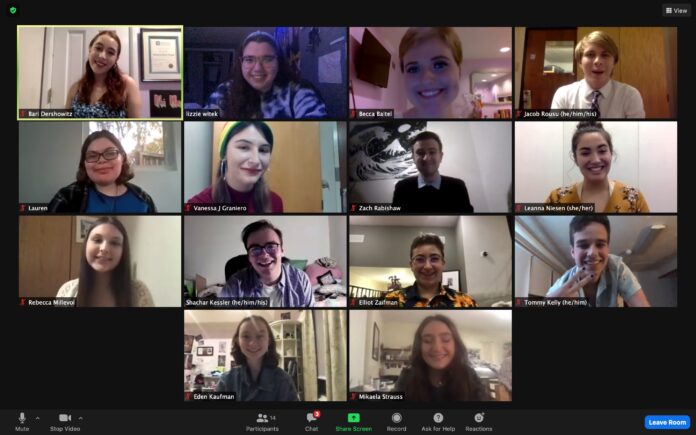The Marginalized Voices Theatre Art Festival (MVTAF) delighted audiences on Saturday, Nov/ 7, and Sunday, Nov. 8, with performances and stories focused on marginalized groups and their personal experiences. The festival was filled with various song performances, dance routines, spoken words, and short plays. Every performer focused on their identities and also their intersectionality, highlighting the components which make them who they are.
Britney Jara ‘23 was the coordinator for the MVTAF and Matthew McCray ‘24 and Rachelle Montilus ‘24 served as the assistant coordinators, handling the entire experience. Jara and her assistants wanted to bring this festival to life to highlight these important and unheard artists.
The show featured performers from the LGBTQ+ community, Black community, Latinx community, South Asian community, and others who hold marginalized identities. .
Throughout the festival, the ”I Am What I Am” Cabaret was one of the main performances and it was intertwined with the other important pieces. The title highlights how these are the performers’ identities and they will not change them or feel ashamed of who they are. The co-directors of the I Am What I Am Cabaret, Shachar Kessler ‘22 and Elizabeth Witek ‘23, worked together to finalize the show in a little over a month and to make sure it was a safe and comfortable space for everyone to express themselves. The various performers focused on their identities and presence while singing a song or sharing a spoken word.
Just some of the outstanding performances included Vanessa Graniero ‘24 with her rendition of Sia’s “Bird Set Free,” Oyinkansola Adebajo’s ‘24 original songs and spoken word, Lauren Fitts’ ‘21 performance of “Out There” from The Hunchback of Notre Dame, Becca Baitel’s ‘23 cover of “Make You Feel My Love” in the style of Adele, and other works. It was a very touching and momentous cabaret with a devoted and talented cast.
In addition, the festival also highlighted a very powerful dance piece choreographed by AnnaMaria Fernandez ‘24 and based on her original poem. The other dance performance, Rangila, was another important and beautiful work created and directed by Amisha Datta ‘21. Datta was also a performer and co-choreographer along with the other two performers, Ruhani Singh ‘23 and Roshni Patel ‘21.
Rangila was both inspiring and fun as the audience was encouraged to get up and dance with the upbeat music. Each of the three performers in the piece inspired their choreography off of real cultural dances and practices, allowing for an honest and fun representation of their South Asian heritage.
One of the stars, Singh, is actually an international student from Kolkata, India, so it felt like the audience was experiencing her local culture without having to go anywhere. Throughout the entire festival, the energy never stopped thanks to these movement pieces and the audience. The viewers carried this warm energy and also shared friendly comments in the chat. It truly was a very supportive and welcoming environment which is needed for an artistic experience where these performers are showcasing their identities. On top of these important pieces, the festival also highlighted two short plays, ”Look a Latino!” by Jorge Ignacio Cortiñas and “Blind Dancing” by Lauren Silverstein. These important plays both focus on a specific marginalized group while bringing a sense of nuance and theatricality. “Look a Latino!” is a play about stereotypes and family dynamics while focusing on the Latinx community. The cast does a wonderful job of delivering three dimensional performances and offering an honest and very timely view of a Latino’s experience in America. Juanita Andrade’s ‘22 direction is respectful of the text by Cortiñas while delivering an exciting and energetic performance given the virtual atmosphere.
“Blind Dancing” was another important play of the festival. It focused on the LGBTQ+ community and the difficulties of one’s family not accepting their identity. This was another exciting piece as the story focused on a lesbian couple and their struggle to be together, the pain of seperation, and the danger of time. Castelle Eskin ‘22 directed the play and balanced the various levels of emotions and dynamics extremely well. The performance also felt present and lively thanks to the way the production was filmed and how the two main characters were connected through a makeshift couch.
Both of these plays deal with complex topics and shine a light on these important and beautiful communities. Thanks to the work of Jara and the assistant coordinators, McCray and Montilus, this festival highlighted so many diverse and unheard voices. The whole MVTAF process began when Jara started auditions and her search to find the perfect talent for the pieces. The artists interested in the experience would fill out a Google Form and Jara actually interviewed every candidate to hear about their perspectives of the festival and to then form a group. Within this group, Jara then held separate auditions for the “I Am What I Am” Cabaret and the two plays, “Look a Latino!” and “Blind Dancing.”
Once all this was done, the team only had a month to put the entire festival together with the various performances, dance pieces, spoken words, and plays. The entire experience turned out wonderful as around 100 guests viewed the MVTAF on Saturday and about 50 people joined on Sunday. Jara said, “The festival was definitely a success. I didn’t focus much on the number of people that showed because what really mattered was everyone that worked so hard to be vulnerable, honest, and willing to share their stories.
“The festival’s success is measured by how heard we felt as marginalized people and the upliftment of our voices,” she also said. “I absolutely loved coordinating this festival and I really can’t believe I was able to do so much in a short amount of time.”
The MVTAF was an extremely important event and it allowed for diversity to be represented and celebrated at Muhlenberg in a multitude of ways. The performers brought their true and honest selves to not only the space, but to their performances, and allowed for a moment of celebration, fun, and wonderful talent.
The show featured performers from the LGBTQ+ community, Black community, Latinx community, South Asian community, and others who hold marginalized identities. .
Throughout the festival, the ”I Am What I Am” Cabaret was one of the main performances and it was intertwined with the other important pieces. The title highlights how these are the performers’ identities and they will not change them or feel ashamed of who they are. The co-directors of the I Am What I Am Cabaret, Shachar Kessler ‘22 and Elizabeth Witek ‘23, worked together to finalize the show in a little over a month and to make sure it was a safe and comfortable space for everyone to express themselves. The various performers focused on their identities and presence while singing a song or sharing a spoken word.
Just some of the outstanding performances included Vanessa Graniero ‘24 with her rendition of Sia’s “Bird Set Free,” Oyinkansola Adebajo’s ‘24 original songs and spoken word, Lauren Fitts’ ‘21 performance of “Out There” from The Hunchback of Notre Dame, Becca Baitel’s ‘23 cover of “Make You Feel My Love” in the style of Adele, and other works. It was a very touching and momentous cabaret with a devoted and talented cast.
In addition, the festival also highlighted a very powerful dance piece choreographed by AnnaMaria Fernandez ‘24 and based on her original poem. The other dance performance, Rangila, was another important and beautiful work created and directed by Amisha Datta ‘21. Datta was also a performer and co-choreographer along with the other two performers, Ruhani Singh ‘23 and Roshni Patel ‘21.
Rangila was both inspiring and fun as the audience was encouraged to get up and dance with the upbeat music. Each of the three performers in the piece inspired their choreography off of real cultural dances and practices, allowing for an honest and fun representation of their South Asian heritage.
One of the stars, Singh, is actually an international student from Kolkata, India, so it felt like the audience was experiencing her local culture without having to go anywhere. Throughout the entire festival, the energy never stopped thanks to these movement pieces and the audience. The viewers carried this warm energy and also shared friendly comments in the chat. It truly was a very supportive and welcoming environment which is needed for an artistic experience where these performers are showcasing their identities. On top of these important pieces, the festival also highlighted two short plays, ”Look a Latino!” by Jorge Ignacio Cortiñas and “Blind Dancing” by Lauren Silverstein. These important plays both focus on a specific marginalized group while bringing a sense of nuance and theatricality. “Look a Latino!” is a play about stereotypes and family dynamics while focusing on the Latinx community. The cast does a wonderful job of delivering three dimensional performances and offering an honest and very timely view of a Latino’s experience in America. Juanita Andrade’s ‘22 direction is respectful of the text by Cortiñas while delivering an exciting and energetic performance given the virtual atmosphere.
“Blind Dancing” was another important play of the festival. It focused on the LGBTQ+ community and the difficulties of one’s family not accepting their identity. This was another exciting piece as the story focused on a lesbian couple and their struggle to be together, the pain of seperation, and the danger of time. Castelle Eskin ‘22 directed the play and balanced the various levels of emotions and dynamics extremely well. The performance also felt present and lively thanks to the way the production was filmed and how the two main characters were connected through a makeshift couch.
Both of these plays deal with complex topics and shine a light on these important and beautiful communities. Thanks to the work of Jara and the assistant coordinators, McCray and Montilus, this festival highlighted so many diverse and unheard voices. The whole MVTAF process began when Jara started auditions and her search to find the perfect talent for the pieces. The artists interested in the experience would fill out a Google Form and Jara actually interviewed every candidate to hear about their perspectives of the festival and to then form a group. Within this group, Jara then held separate auditions for the “I Am What I Am” Cabaret and the two plays, “Look a Latino!” and “Blind Dancing.”
Once all this was done, the team only had a month to put the entire festival together with the various performances, dance pieces, spoken words, and plays. The entire experience turned out wonderful as around 100 guests viewed the MVTAF on Saturday and about 50 people joined on Sunday. Jara said, “The festival was definitely a success. I didn’t focus much on the number of people that showed because what really mattered was everyone that worked so hard to be vulnerable, honest, and willing to share their stories.
“The festival’s success is measured by how heard we felt as marginalized people and the upliftment of our voices,” she also said. “I absolutely loved coordinating this festival and I really can’t believe I was able to do so much in a short amount of time.”
The MVTAF was an extremely important event and it allowed for diversity to be represented and celebrated at Muhlenberg in a multitude of ways. The performers brought their true and honest selves to not only the space, but to their performances, and allowed for a moment of celebration, fun, and wonderful talent.
Johnny '24 is a Theatre and Media and Communication double major at 'Berg. He loves to highlight the voices of artists across campus and to showcase the wide variety of events at Muhlenberg. He likes to think he is funny, but that is up for debate.























